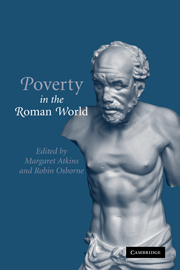Book contents
- Frontmatter
- Contents
- List of contributors
- Preface
- List of abbreviations
- Chapter 1 Introduction: Roman poverty in context
- Chapter 2 The poor in the city of Rome
- Chapter 3 Stratification, deprivation and quality of life
- Chapter 4 ‘You do him no service’: an exploration of pagan almsgiving
- Chapter 5 Writing poverty in Rome
- Chapter 6 Poverty and population in Roman Egypt
- Chapter 7 A pragmatic approach to poverty and riches: Ambrosiaster's quaestio 124
- Chapter 8 Portraying the poor: descriptions of poverty in Christian texts from the late Roman empire
- Chapter 9 Throwing parties for the poor: poverty and splendour in the late antique church
- Chapter 10 Salvian, the ideal Christian community and the fate of the poor in fifth-century Gaul
- Chapter 11 Poverty and Roman law
- Bibliography
- Index
Chapter 1 - Introduction: Roman poverty in context
Published online by Cambridge University Press: 22 September 2009
- Frontmatter
- Contents
- List of contributors
- Preface
- List of abbreviations
- Chapter 1 Introduction: Roman poverty in context
- Chapter 2 The poor in the city of Rome
- Chapter 3 Stratification, deprivation and quality of life
- Chapter 4 ‘You do him no service’: an exploration of pagan almsgiving
- Chapter 5 Writing poverty in Rome
- Chapter 6 Poverty and population in Roman Egypt
- Chapter 7 A pragmatic approach to poverty and riches: Ambrosiaster's quaestio 124
- Chapter 8 Portraying the poor: descriptions of poverty in Christian texts from the late Roman empire
- Chapter 9 Throwing parties for the poor: poverty and splendour in the late antique church
- Chapter 10 Salvian, the ideal Christian community and the fate of the poor in fifth-century Gaul
- Chapter 11 Poverty and Roman law
- Bibliography
- Index
Summary
What are we studying when we study poverty? Are we studying the social and economic structure that means that a proportion of the population has barely adequate access to the resources required for life? Or are we studying those in a society who at any moment happen to have less than some particular, and more or less arbitrary, threshold of resources? Or again, are we studying how the society in question analyses its own structure, how it classifies those with least resources, what it does about them and how it justifies to itself what it does or does not do?
Studying poverty in contemporary societies is closely linked to the question of what to do about it; ‘make poverty history’ is the political slogan of 2005. Doing something about it depends on understanding the nature of the problem to begin with. Are the poor a random collection of people who for different reasons have fallen on hard times but can be expected to improve their lot in better times (‘conjunctural poverty’ as it is sometimes called)? Or are the poor trapped by the structure of economic system, whether that be feudalism, capitalism, or whatever, so that in good times as well as hard times they will remain impoverished (‘structural poverty’)? Is poverty an economic problem (because a given society does not produce enough resources to go round), or is it a social problem (because the resources are there but for social reasons are maldistributed)?
- Type
- Chapter
- Information
- Poverty in the Roman World , pp. 1 - 20Publisher: Cambridge University PressPrint publication year: 2006
- 1
- Cited by



